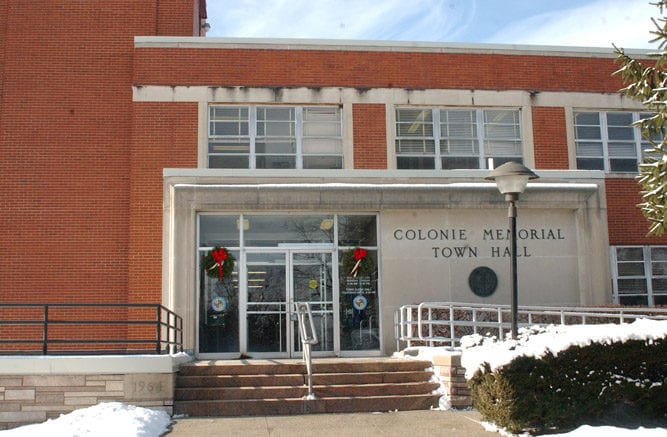COLONIE — Without a paid Fire Department, members of law enforcement dominated the top paid town employees in 2017, and the employees who took home the most overtime.
At $15.4 million, the Police Department is by far the most expensive in the $49.5 million general fund budget and the $90.8 million all-funds budget. It is projected to drop about $65,000 this year, however.
 The next most expensive department is the Latham Water District, which has a budget of $13.4 million.
The next most expensive department is the Latham Water District, which has a budget of $13.4 million.
The most costly overall expense is town wide employee salaries and benefits. In 2018, salaries will account for $26.6 million, up from $26.4 million in 2017, and benefits in 2018 will cost $15.2 million, up $14.4 million in 2017.
More than half of the town’s allocation for salaries, $13.8, is paid to the 113 sworn, uniformed police officers.
Overtime, which can be a hot button issue, is spread out through each division within the Police Department including $11,000 for administration, $480,000 for traffic, $400,000 for detectives and $720,000 for patrol.
There are basically two schools of thought when it comes to municipal overtime. The first is that if it is mismanaged or abused, it will, logically, cost a municipality unnecessarily. The second, though, is that paying an existing employee overtime is cheaper than hiring a full time employee and paying an additional benefit package.
There is also some overtime that is simply unavoidable, such as when a water main break occur at 2 a.m. or when police investigate certain crimes.
“The Colonie Police Department’s 2017 overtime numbers reflect a decrease in patrol overtime and an increase in criminal investigation overtime,” said

Supervisor Paula Mahan of the nearly $90,000 decrease in patrol overtime in 2017. “First, I am very pleased with the decrease in patrol overtime, which is directly attributable to our having increased the CPD’s staffing level.”
The 113 officers in the Colonie Police Department is the highest number in history, Mahan said. And, with the department at full staff, there is less of a need to pay overtime to fill in for offers on vacation or taking sick time and/or the delay in replacing a spot when an officer retires.
Police Chief Jonathan Teale said the officers getting the most overtime in 2017 were detectives working labor intensive cases like the Computer Crimes Unit, investigators working the busy traffic division and those working in the Special Investigations Unit. The latter, he said, focuses on drug crimes and last year generated $135,000 in drug seizure money for the department.
He has also seen an increase in other labor intensive cases like those spurred by the heroin epidemic and those involving emotionally disturbed person calls.
“We monitor overtime every month and generally as the call volume goes up so does the amount of overtime,” he said, adding the volume of calls were up 3 percent from 2016 to 2017. “While call volumes are going up, though, crime is going down so that says something about the job we are doing.”
Mahan said that in 2017, there was an overall crime decrease of 6.7 percent and that includes a 3 percent drop in serious crimes and a 10 percent drop in less serious crime.
 “The CPD conducted several major criminal investigations in 2017, and this activity is reflected in the department’s top overtime earners,” she said. “With the exception of two patrolmen, all the CPD top overtime earners primarily carry investigative responsibilities.”
“The CPD conducted several major criminal investigations in 2017, and this activity is reflected in the department’s top overtime earners,” she said. “With the exception of two patrolmen, all the CPD top overtime earners primarily carry investigative responsibilities.”
The highest paid employee on the town payroll, who made the second most in OT, is Sgt. John O’Donnell. He brought home $145,109 in 2017 according to town records, and of that $42,114 was overtime. Teale said he is an 18-year veteran and a senior traffic investigator.
Second is Daniel Belles, also a sergeant. He is a 12-year veteran working as a detective on “some of the most serious cases,” Teale said. Belles made a total of $142,394 in 2017 and of that $42,928 was in OT.
Third is also a police detective with seven years on the force. Robert Willey made a total of $134,898 in 2017 and his overtime, $45,142, was the most of any employee in 2017.
Town Board member Jennifer Whalen said she noticed the large overtime numbers in the budget and brought up the issue with the comptroller. But, she said, after learning more about it, she opted not to make it an issue as the budget worked its way through the process late last year.
“At first glance, it does seem like we are spending
a lot of money on overtime and we are,” she said. “But we are also one of the safest towns in the nation and we are right in the middle of Troy, Albany and Schenectady, so we do have a lot of traffic passing through our town and that places a huge burden on our Police Department.
“I don’t think the [overtime] numbers are that egregious with a municipality of our size. I think the supervisor, the comptroller and the police chief take the issue seriously and are responsible about improving the quality of our public safety and doing it at a reasonable cost.”



